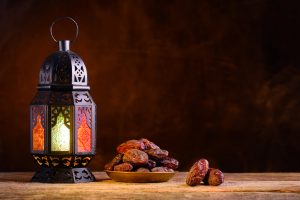Bashir Ahmad Orchard served as Editor of the Review of Religions from 1984 to 1993. He produced a regular monthly feature in the magazine under the title of ‘Guide Posts’ in which he covered various topics on the subject of personal spiritual development supported by quotations from the Holy Qur’an, the Hadith, religious scriptures, poems and inspirational writings including those of the Promised Messiah(as).
The Right Path
God’s purpose for man is that he should recognise Him and strive his utmost to mould his life in accordance with His ordinances. This may be best achieved by seeking guidance through prayer, finding the right path and adhering to it with the spirit of earnest devotion. The spiritual wayfarer should endeavour to manifest in his person the holy attributes of God and at the same time pray regularly and fervently for divine help and protection from going astray. God says in the Holy Qur’an:
I have not created the Jinn and the men but that they may worship Me. (Ch.51: v.57)
Worship of God is not confined only to offering formal prayers but covers every aspect of personal conduct which should be performed for the glory of God. This is practical worship involving every thought, word and deed. Islamic worship is a spiritual way of life portraying righteous behaviour as expounded in the Holy Qur’an and by the Prophet Muhammad(saw). No doubt this holy ideal is not easy to attain. It is, in fact, an endless progressive acquisition allowing for constant improvement whatever may be the stage of development reached. The spiritual traveller is ever aware of his weaknesses and shortcomings; but all along the route he is conscious of his progress as are those who know and observe him. They notice remarkable changes in his demeanour. Fortunate and blessed are those who advance along the path of righteousness and walk with God ever illuminated with the light of His presence. His progress much depends on steadfastness and not giving up the ill spiritual struggle when faced with obstacles of one kind and another. Many have despaired and floundered in the murky waters of misfortunes and absence of spiritual stimulation and experience. Such temporary phases are the lot of all spiritual wayfarers to a lesser or greater degree from time to time. They are testing times for everyone. Times when one should hold on firmly to the rope of Allah and not despair or deviate. In the Holy Qur’an we read the prayer
…Our Lord, pour upon us steadfastness and cause us to die resigned unto Thee. (Ch.7: V.127)
During the course of prescribed prayers a Muslim implores God many times a day to guide and entrench him on the right path. He should not become negligent or despondent if at times his prayers seem to go unanswered or his religious enthusiasm seems to be reduced. He should persevere and sooner or later he will taste the fruit of his consistency in faith. Even those very close to God sometimes pass through periods when the enjoyment of prayer and the pleasure of divine experience lessons. On this matter Hadhrat Mirza Ghulam Ahmad(as) the Promised Messiah and Holy Founder of the Ahmadiyya movement in Islam has commented:
‘The perfection of steadfastness is that when one is encircled by calamities and life and honour and good name are all in peril in the cause of Allah, and no means of comfort are available, so much so, that even visions and dreams and revelations are suspended by God as a trial and one is left helpless among terrible dangers, at such time one should not lose heart, nor retreat like a coward nor let one’s faithfulness be put in doubt in the heart. (Philosophy of the Teachings of Islam)
A firm believer looks upon all trials as blessings in disguise which he can turn to good account with the help of God. He sails through them as the ocean liner sails through the storm proving its sea-worthiness. He is not disheartened but remains steadfast in faith remembering the words of God in the Holy Qur’an:
As for those who say, ‘Our Lord is Allah,’ and then remain steadfast, the angels descend on them, saying: ‘Fear ye not, nor grieve; and rejoice in the garden that you were promised. We are your friends in this life and in the Hereafter. Therein you will have all that your souls will desire, and therein you will have all that you will ask for – an entertainment from the Most Forgiving, the Merciful. (Ch.41: vs.31-33)
Man is tried in devious ways for his own good. They are means of growth in spiritual stamina. All who would advance on the right path must be prepared to face adverse circumstances which with patience and steadfastness, may be converted into spiritual gems.
Object Of Fasting
God has revealed that the primary object of fasting in the manner prescribed by Islam is the acquisition of righteousness:
O ye who believe! fasting is prescribed for you as it was prescribed for those before you, so that you may become righteous. (Ch.2:V.184)
This should be the foremost desire and aim of a Muslim. Through self-analysis he should always be aware of his shortcomings and weaknesses; and at the same time he should be ever anxious to overcome them and to make constant progress towards his cherished goal – righteousness and self-purification. He should never be satisfied with his present spiritual condition. Elsewhere in the Holy Qur’an God says on the subject of righteousness:
…Verily the most honourable amongst you in the sight of Allah is he who is most righteous among you… (Ch.49:V.14)
…The best provision is righteousness… (Ch.2:V.198)
O ye men, worship your Lord who created you and those who were before you, that you may become righteous. (Ch.2:V.22)
It is perfectly clear that the paramount aim in the life of a Muslim is to acquire the mantle of righteousness which again is emphasised in the Holy Qur’an:
The best and the most elegant dress is the raiment of righteousness – that is the best… (Ch.7:V.27)
The holy month of Ramadhan is now upon us and we should take full advantage of this wonderful opportunity to derive as much spiritual benefit from it as possible because God has promised immense heavenly blessings for those who observe the month with earnest devotion. How is fasting a means to enable one to become more righteous? At the outset one should possess a strong desire to improve in righteousness. If one is indifferent or not much concerned about this matter then one is unlikely to undergo much of a spiritual change for the better. Fasting itself does not produce automatic holiness. One should be imbibed with the true spirit of fasting. The Holy Prophet(sa) has said:
‘He who abstains from food and drink during the period of fasting but does not strive to safeguard himself against moral lapses, starves for no purpose.’ (Bukhari)
Some essential points which should be kept in mind and observed while fasting now follow:
The Holy Qur’an
While the reading of a portion of the Holy Qur’an should be our daily practice, we are well advised to study it more diligently during the month of Ramadhan and so fill our minds with its divine and holy truths. Where there exists a congregation of the faithful they usually get together to listen to a commentary and explanation of a portion of the Holy Qur’an daily. Whether or not one is able to attend these instructive sessions one should at least make time to read and study the Holy Book in one’s own home or elsewhere. The Holy Qur’an is a revelation of Divine truths and a cure for all spiritual ills.
Prayers
As a devout Muslim one should be regular and strict in the observance of daily prayers every day of one’s life; but during Ramadhan one should endeavour to pray with greater fervour and pathos because God has said that during this holy month He answers prayer more than ever. Special value has been placed on Tahajjud prayers (voluntary pre-dawn prayers). At all times these prayers are very efficacious especially during Ramadhan when God rains down His blessings and succour profusely upon sincere and devout supplicants.
Personal Conduct
One should pay particular attention to one’s personal behaviour including one’s manner of talk. One should guard one’s tongue very carefully against quarrelling, backbiting, sarcasm, rudeness and, infact, every kind of unpleasant behaviour. One should strive to adopt a pleasant and loving nature and endeavour to be patient with everybody whatever may be their mannerisms or defects; and resolve that this attitude should become a permanent feature of one’s character for ever after.
Charity
During the month of Ramadhan one is exhorted to be specially charitable towards others. While fasting one is able to realise and sympathise to a greater extent with one’s less fortunate brethren who suffer by the millions from lack of sustenance and even starvation. One is urged to help them and, at the same time, one feels grateful and proffers thanks to God for the good fortune one. enjoys. Charity means practical kindliness which is not limited only to financial and material donations. It covers all kinds of good works for the betterment of mankind. The Holy Prophet Muhammad(sa) said:
‘Every good work and every kind deed is charity.’
A kind word, good deed, helping hand, tenderness, sympathy, cheerfulness, friendliness are all practical demonstrations of charity. God says in the Holy Qur’an:
…and hasten, vying with one another, in good works. (Ch.3:V.115)
And slacken not in seeking these people. (Ch.4:V.105)
Charity is the noblest employment. It is righteousness in action.
Avoidance of Sin
Sin is the violation of a divine commandment of one kind or another and is usually caused by submitting to temptation. Fasting strengthens one in self-control and self-restraint which one is able to apply in resisting temptations when they arise. Fasting strengthens one’s power of self-mastery which is a priceless weapon against the forces of Satan along with, the efficacy of prayer. Furthermore while fasting one is reminded how much more important it is to avoid sin than it is to avoid daily nourishment for a period of time. Fasting is a potent spiritual exercise for the development of righteousness which is the ultimate object of fasting.




Add Comment